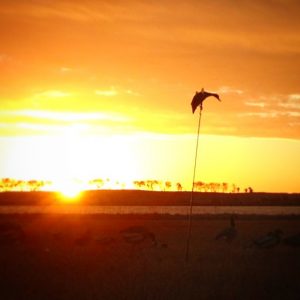Humid Day Waterfowl – Calling on Sticky Days
Those early-season teal hunts are brutal. You break a sweat just looking out the window of your bedroom, and you can see the humidity in the air. As you slice your way through the thick air to your truck, your collar is already wet, and your hat feels like it doubled in weight. Humid day waterfowl hunting makes you want to dive into the water with the dog!
High humidity affects us personally, but does it have an affect on the sounds we produce with our calls? Does the air having a higher moisture content actually affect sound enough to matter for waterfowlers? How should we change our calling style for humid day waterfowl hunts?

Scientific Breakdown
First, let’s discuss the science. Water is denser than air, and therefore sound waves travel differently through water than air. Humidity is a measure of how much water is suspended in air. Therefore, on days with high humidity, there is a high amount of water suspended in air. This means sound waves will constantly be changing between air and water as they propagate. This will do two things to the sound waves: they will dissipate at a greater rate, and they’ll absorb at a greater rate.
As the sound waves move from air to water, some of the energy is refracted, and some is absorbed into the water. As it moves back from water to air, it’s again refracted and absorbed. So, sound will travel less distance in 99% humidity than it will in 1% humidity, and the sound will spread out much more in high humidity as compared to low.
However, this dissipation and absorption does not happen at a high enough rate to affect waterfowlers. Even with extremely high humidity, the affects will only be appreciably noticed at distances much greater than even the most aggressive callers would consider appropriate.
Adjusting Your Calling Style
Further Reading and References
There are other weather conditions which affect sound enough to change your calling style. Check out our other articles in the series “How Weather Affects Calling”, follow us on Facebook, and subscribe to our newsletter to receive our latest articles directly in your inbox.
References
- https://en.wikibooks.org/wiki/Engineering_Acoustics/Outdoor_Sound_Propagation
- http://hyperphysics.phy-astr.gsu.edu/hbase/hframe.html
- http://www.acousticsbydesign.com/acoustics-blog/weather-affects-noise-study.htm
- http://classroom.synonym.com/effect-wind-sound-transmission-23531.html
- https://www.quora.com/Why-do-airplanes-sound-louder-when-it-rains-or-is-cloudy
- http://www.sfu.ca/sonic-studio/handbook/Sound_Propagation.html


